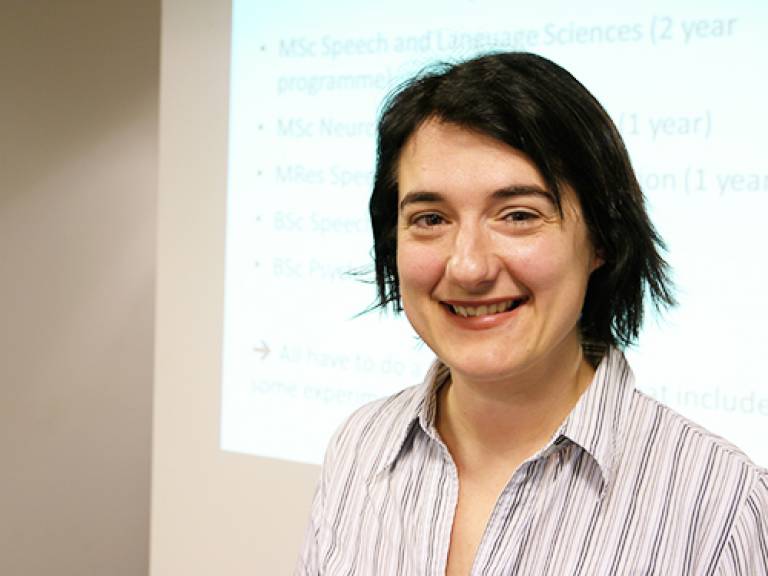Involving students in research is a “win-win”, says Dr Perovic
At a UCL Arena Exchange session, Dr Alexandra Perovic, Lecturer in Clinical Linguistics, explained how she works with students on her research projects.

23 May 2014
The importance of research-based education
For anyone who remains unconvinced, Dr Perovic kicked off her UCL Arena presentation by using a few key quotes to explain the advantages of research-based education.
“Universities should treat learning as not yet wholly solved problems and hence always in research mode,” said founder of the University of Berlin, Wilhelm von Humboldt, in 1810.
A little more recently, Visiting Professor of Higher Education Carmel McNaught wrote a paper on implementing research-based education that explained why the idea is “a highly appropriate priority for a research-intensive university such as UCL.”
Dr Perovic pointed to three essential elements of research-based education highlighted by Professor McNaught:
- The embedding of scholarly inquiry in all curricula
- The use of authentic learning (tasks that are as close as possible to real-life situations)
- The importance of engaging in collaborative learning within communities of practice.
An example of Dr Perovic's collaborative approach to research
Dr Perovic works on a mixture of short-term and long-term projects. A recent small scale project was entitled Grammar in a French/English Bilingual Child with Williams syndrome (2013-2014).
It was the first time a study of a bilingual child with this condition had ever been attempted, and it was made possible by the involvement of a fourth-year undergraduate who was a French-native speaker.
It was a time-consuming process. Since the study was novel, the student needed help in identifying areas of research as well as obtaining testing materials in French. However, the study was a success.
The student presented at the First UCL Brain Sciences Undergraduate Conference and won first prize. The findings are due to be written for publication this year.
Dr Perovic’s research
Dr Perovic’s research involves investigating the knowledge of language in children. This means working with children who are typically developing and those with developmental disorders, such as Autism Spectrum Disorders (ASD), Down syndrome and Williams syndrome.
Including students in her research
All of Dr Perovic’s research requires collection of data from human participants – a lengthy and laborious process.
Students collect data by testing and interviewing children. They also analyse and write up parts of the research and are sometimes involved in the design of the study.
They work collaboratively by collecting data in small teams, and they also take part in writing the ethics application and recruiting participants.
They are invited to share results by presenting findings at relevant conferences and are credited as co-authors on papers submitted for publication.
Benefits for academics and students
Dr Perovic made it clear that the involvement of students meant a lot of work for all involved, but that it was a win-win situation.
As she is in her early career and has little access to lab facilities or funding, supervision of final-year projects is the best way to get pilot data. She can then use that data as the basis of which to apply for grants.
Meanwhile, for the student, their participation in a collaborative project has proven to be an extremely rewarding and authentic learning experience and also gives them an edge in the competitive job market upon graduation.
Selecting students
They come from a number of programmes at both master’s and bachelor’s level.
Their backgrounds and experience vary, but what’s especially important to Dr Perovic, given that most students will be required to work directly with children, is maturity and inter-personal skills.
Challenges when conducting research with students
There are three big challenges that Dr Perovic highlighted:
- Many students are keen to get involved, but not all have the right personal attributes.
- Unequal opportunities can also rise from funding issues. For example, some students have access to funding to cover their travel expenses through their programmes of study, while others don’t.
- And then there’s the co-authorship conundrum. If the study is small scale, it is easy to include the student as the author in the study. If the study is large scale, where data from hundreds of participants is analysed, there will be 10 or more students involved in data collection. Should they all be included, just some or none?
 Close
Close

